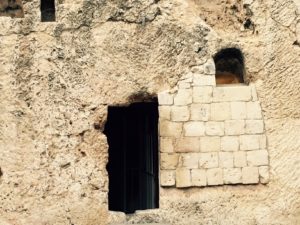On this first week after Resurrection Sunday, five different Resurrection Reflections keep coming to my heart. As we still quarantine from COVID-19, we are all going through different emotions. May these lessons encourage each of us.
1.God shakes things up in tough times and miraculous times. On the third day morning after Jesus was crucified, Mary Magdalene and “the other Mary” discovered the miracle of Jesus’ Resurrection. They not only discovered the tomb empty, they experienced a great earthquake. “And behold, there was a great earthquake, for an angel of the Lord descended from heaven and came and rolled back the stone and sat on it.” Matthew 28:2 ESV. They were shaken, just as we have been shaken with the COVID-19 pandemic. Three days before they had also experienced an earthquake on Good Friday after Jesus was crucified (Matthew 27:51). Shaking happens during the tough times as well as during miraculous times.
2.It is normal to experience fear, great joy and doubt. The first thing the Angel said to the women was not to be afraid. It’s normal to feel afraid. That’s why It is said throughout the Bible, hundreds of times, “do not be afraid.”Then the angel confirmed what the women already knew. “He is not here, for He has risen! (Matt 28:6 ESV) The angel told them to “Go quickly and tell the disciples that he has risen from the dead.” (Matt 28:7 ESV).

The next verse struck me more than ever because of what we are all experiencing with the pandemic. “So they departed quickly from the tomb with fear and great joy, and ran to tell his disciples.” (Matt 28:8) Friends, it is OK to experience fear and great joy at the same time. The women, like each of us, were fulfilling their purpose. It’s OK to move forward in fear and great joy. Keep going.
A few verses later is The Great Commission in Matthew 28:18-20, our high calling as Christians. “Go therefore and make disciples of all nations…” Whether we are going and telling disciples or going and making disciples, keep going. It’s what we were made to do.
Friend, Keep going, even when our knees shake.
Keep going, even when our world shakes.
Let’s keep going and telling, keep going and making with fear and great joy. We were made for this.
3. God often uses Women and Angels as His Messengers. Throughout the Old and New Testament, including the Resurrection, the Lord uses women and angels to deliver important messengers. I found it particularly amazing how God used angels here. Not only does God use women to discover Jesus’ tomb empty, He uses angels to roll the stone away, sit on it, and tell the women what to do. “But Mary stood weeping outside the tomb, and as she wept she stooped to look into the tomb. And she saw two angels in white, sitting where the body of Jesus had lain, one at the head and one at the feet. They said to her, ‘Woman, why are you weeping?’… –John 20:11-14 ESV.
Let’s look at another amazing place where angels were used. When Moses’ foreman Bezalel was building the ark of the covenant, “He made a mercy seat of pure gold. Two cubits and a half was its length, and a cubit and a half was its breadth. And he made two cherubim of gold. He made them of hammered work on the two ends of the mercy seat, one cherub on the one end, and one cherub on the other end. Of one piece with the mercy seat he made the cherubim on its two ends.” –Exodus 37:6-8 ESV.
Jesus’ empty tomb is our Mercy Seat with angels on both ends, just as Moses followed God’s commands 3000 years before!
Was that important? Absolutely! In order to understand the significance of the folded napkin, it is helpful for us to understand a little bit about Hebrew tradition of that day. The folded napkin had to do with the master and servant, and every Jewish boy knew this tradition. When the servant set the dinner table for the master, he made sure that it was exactly the way the master wanted it. The table was furnished perfectly, and then the servant would wait, just out of sight, until the master had finished eating.
The servant would not dare touch the table until the master was finished. Now if the master was finished eating, he would rise from the table, wipe his fingers and mouth, then his beard, and wad up the napkin and toss it onto the table. The servant would then know to clear the table. In those days, the wadded napkin meant, “I’m finished.” This is like what Jesus said from the cross.
But if the master got up from the table, folded his napkin and laid it beside his plate, the servant would not dare touch the table, because the folded napkin meant, “I’m coming back!”
I asked my Messianic Jewish Scholar Steve J. of this Hebrew tradition’s validity aligned with the folded napkin: “I have heard that before, and think it has merit. Although the Gospel of John was written with a Gentile audience in mind…the fact it is mentioned at all in John beckons the question as to why, since we presume there is no wasted scripture.”
Let us be reminded daily during this post-Resurrection season, Jesus Christ is “Not Finished.” He is coming back for us as Believers who have accepted Him as Lord and Savior. Be encouraged, friend, and let’s do our best to spread the Good News of Jesus and His Word. May we live every day as Resurrection Sunday knowing Jesus will return for us one day.







 Danya Jordan
Danya Jordan